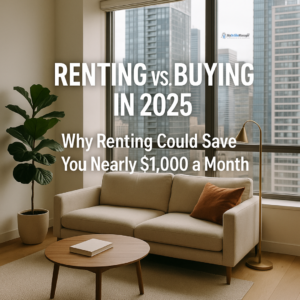For decades, the American dream has centered on homeownership. Owning a house has long been seen as the ultimate milestone proof of stability, success, and financial growth. But in 2025, the equation looks very different.
A recent report revealed that, on average, renting is about $908 cheaper per month than buying a home nationwide. That’s not just pocket change it’s more than $10,000 in annual savings. The findings shed light on how rising mortgage rates, insurance premiums, and home prices have shifted the rent vs. buy debate in ways many potential homeowners didn’t expect.
So, is renting really the better deal in today’s market? Let’s break down the numbers, regional trends, and what it means for anyone weighing whether to rent or buy.
The Monthly Savings: What the Data Shows
The report compared the total cost of homeownership including mortgage payments, property taxes, insurance, and maintenance with the average rent across U.S. metro areas. Here’s what stood out:
-
National average gap: Renters save $908/month compared to homeowners.
-
Biggest savings: In expensive metros like San Francisco, San Jose, and Los Angeles, owning can cost nearly 190% more per month than renting.
-
Smaller gaps: In affordable cities such as Pittsburgh, Cleveland, and Detroit, the monthly cost difference shrinks significantly. In some cases, owning can be only slightly more expensive or even cheaper than renting.
This suggests that while the national average favors renters, the decision depends heavily on location.
Why Renting Is Cheaper Right Now
Several factors contribute to renting’s surprising affordability:
1. Mortgage Rates Remain Elevated
While lower than their 2023 peaks, today’s mortgage rates still sit at historically high levels compared to the ultra-low rates of the 2010s. Even a 1–2% difference in interest rates can add hundreds of dollars to a monthly mortgage payment.
2. Property Taxes and Insurance Costs Are Rising
Homeowners are not only paying more for their mortgages, but also for property taxes and insurance premiums, which have climbed nationwide. In states prone to wildfires, hurricanes, or floods, insurance has become a major burden.
3. Slowing Rent Growth
After years of rapid increases, rent growth has cooled in many metros. This moderation, combined with high ownership costs, tilts the scale toward renting.
4. Hidden Costs of Ownership
Repairs, maintenance, and HOA fees often catch new homeowners by surprise. These “extra” expenses don’t affect renters, who can rely on landlords for most property upkeep.
The Long-Term Case for Owning
Even though renting may look like the clear winner right now, homeownership still carries long-term financial and lifestyle advantages.
-
Building Equity
Every mortgage payment puts money into an asset that can appreciate over time, unlike rent, which builds no ownership stake. -
Stability and Security
Fixed-rate mortgages provide predictable housing costs, while renters face the risk of rising rents or non-renewed leases. -
Customization
Owners can remodel, upgrade, and shape their property to fit their lifestyle. -
Tax Benefits
In some areas, homeowners may deduct mortgage interest and property taxes, reducing the net cost of ownership.
In other words: renting may win the short-term battle, but owning can still win the long-term war if done strategically.
Regional Trends: Where Renting or Buying Makes Sense
The report highlights that the rent vs. buy decision isn’t the same everywhere:
-
West Coast & Sunbelt Metros: Places like San Francisco, San Jose, Los Angeles, Miami, and Austin show the largest savings for renters. High home prices combined with elevated interest rates make buying especially costly.
-
Midwest & Rust Belt Metros: Cities such as Detroit, Cleveland, and Pittsburgh are far more balanced. In some cases, monthly ownership costs are close to or even lower than rent, making these areas more favorable for buyers.
-
Southern Metros: Markets like Atlanta, Charlotte, and Dallas fall somewhere in between, with noticeable but not extreme gaps between renting and owning.
Questions to Ask Before Deciding
If you’re debating whether to rent or buy in 2025, here are the key questions to guide your decision:
-
How long will you stay?
If you’re not planning to stay at least 5–7 years, renting may be better, since selling a home involves high transaction costs (closing fees, realtor commissions, etc.). -
What’s your local market like?
Research rent vs. buy ratios in your city. A market like San Francisco looks very different from Pittsburgh. -
What’s your financial cushion?
Do you have the down payment, emergency savings, and cash flow to handle surprise home repairs? -
Do you value flexibility or stability?
Renting offers mobility, while owning offers permanence. Your lifestyle goals should drive the choice as much as the math.
Final Thoughts
The latest data paints a striking picture: renting is nearly $1,000 cheaper per month nationwide than buying in 2025. For many households, that savings can mean financial breathing room, debt payoff, or investment opportunities elsewhere.
But that doesn’t mean homeownership has lost its value. Equity, stability, and the sense of “home” still make buying appealing for many especially in regions where the rent vs. buy gap is narrow.
Ultimately, the decision comes down to timing, location, and personal goals. Renting may be smarter for some right now, but for others, buying could still be the right long-term move.

